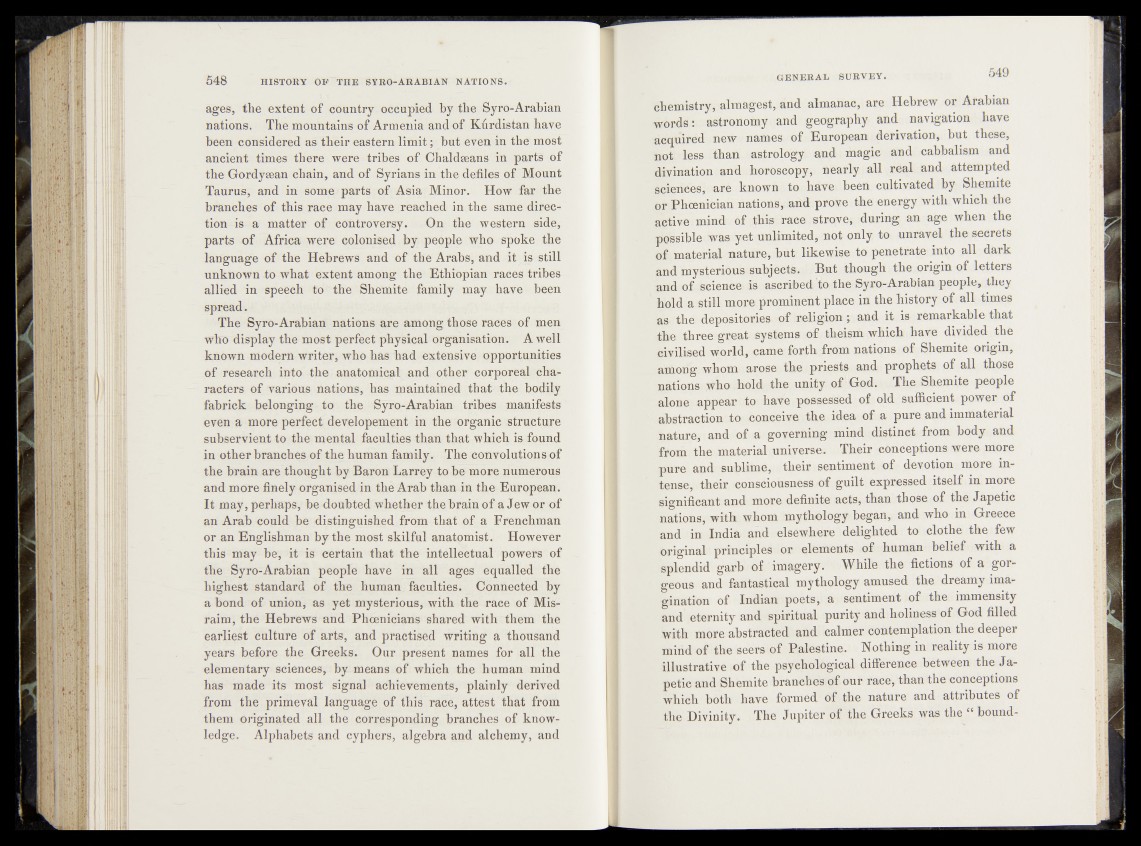
ages, the extent of country occupied by the Syro-Arabian
nations. The mountains of Armenia and of Ktirdistan have
been considered as their eastern limit ;.-buf even in the most
ancient times there were tribes of Chaldseans in parts oj§:
the Gordysean chain, and of Syrians in- the defiles of Mount
Taurus, and in some parts of Asia Minor. How far the
branches of this race may have reached in the same direction
is a matter of controversy. On the western side,
parts of Africa were colonised by people who spoke the
language of the Hebrews and of the Arabs, and it is still
unknown to what extent among the Ethiopian races tribes
allied in speech to the Shemite family may have been
spread.-
The Syro-Arabian nations are among those races of men
who display the most perfect physical organisation. A well
known modern writer, who has had extensive opportunities
of research into the anatomical and other corpora
racters of various nations, has maintained that- .the ' bodily
fabrick belonging to the Syro-Arabian tribes manifests
even a more perfect developement in the-organic structure
subservient to the mental faculties than that which is found
in other branches of the human family. The convolutions of
the brain are thought by Baron Larrey to be more numerous
and more finely organised in the Arab than in the- European.
It may, perhaps, be doubted whether the brain of a Jew or of
an Arab could be distinguished from that of a Frenchman
or an Englishman by the most skilful anatpmist. However
this may be, it is certain that the intellectual powers of
the Syro-Arabian people have in all ages equalled the
highest standard of the human faculties. Connected by
a bond of union, as yet mysterious, with the race of Mis-
raim, the Hebrews and Phoenicians shared with them the
earliest culture of arts, and practised Writing a thousand
years before the Greeks. Our present names for all the
elementary sciences, by means of which the human mind
has made its most signal achievements, plainly derived
from the primeval language of this race, attest that from
them originated all the corresponding branches of knowledge.
Alphabets and cyphers, algebra and alchemy, and
chemistry, almagest, and almanac, are Hebrew or Arabian
words: astronomy and geography and navigation have
acquired new names of European derivation, but these,
not less than astrology and magic and cabbalism and
divination and horoscopy, nearly all real and attempted
sciences, are known to have been cultivated by Shemite
or Phoenician nations, and prove the energy with which the
active mind of this race strove}; iduring an age when the
possible was yet unlimited, not only, to unravel the secrets
of material nature, but likewise to penetrate into all dark
and mysterious subjects. But, though the origin of letters
and of science is ascribed to the Syro-Arabian people, they
hold a still more prominent place in the history of all times
as the depositaries of ireHgion:; and it is remarkable that
the three great systems of theism which have divided the
civilised world, came forth from nations of Shemite origin,
among whom , arose the priests and prophets of all those
nations jfao hold the unity of' God. rTteBhemitC people
alone appear to have possessed of old sufficient power of
abstraction to conceive the idea of a pure and immaterial
nature, and of a governing mind distinct from body and
from the material universe. Their conceptions were more
pure and sublime, their sentiment of devotion more intense,
. their consciousness of guilt expressed itself in. more
significant and more definite acts, than those of the Japetic
nations, with whom mythology began, and who ini Greece
and in India and elsewhere delighted to clothe the few
original principles or elements of human belief with a
splendid garb of imagery. While the fictions of a gorgeous
and fantastical mythology amused the dreamy imagination
of Indian poetsy a sentiment of thfes immensity
and eternity and spiritual purity and holiness of God filled
with more abstracted and calmer contemplation the deeper
mind of the seers of Palestine. Nothing in reality is more
illustrative of the psychological difference between the Japetic
and Shemite branches, of our race, than the conceptions
whffih both have formed of the nature and attributes of
the Divinity. The Jupiter of the Greeks was the “ bound